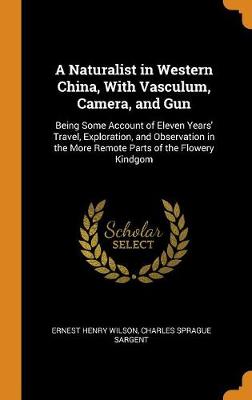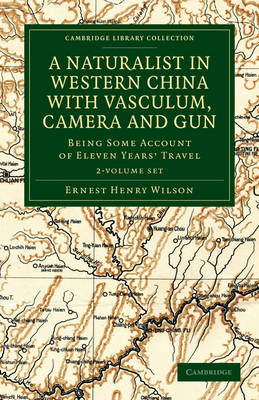Cambridge Library Collection - Botany and Horticulture
1 primary work • 4 total works
Volume 1
A Naturalist in Western China, with Vasculum, Camera, and Gun
by Ernest Henry Wilson and Charles Sprague Sargent
Published 16 August 2009
Ernest Henry Wilson (1876-1930) was introduced to China in 1899 when, as a promising young botanist, he was sent there by horticulturalist Henry Veitch (1840-1924) to collect the seed of the handkerchief tree, Davidia involucrata, for propagation in Britain. Subsequent trips saw Wilson bringing back hundreds of seed samples and plant collections, introducing many Chinese plants to Europe and North America. He wrote extensively about his travels in China: this two-volume work was published in 1913. Although much of the text is concerned with plant life, Wilson also gives a great deal of attention to the wider landscape around him. In addition, Wilson took a camera, and these volumes contain photographs of parts of China rarely seen by Europeans in the early twentieth century. Volume 1 covers his travels from Hupeh (Hubei) to Szechuan and into the Tibetan region before ending at Wa Wu Shan.
A Naturalist in Western China with Vasculum, Camera and Gun 2 Volume Set
by Ernest Henry Wilson
Published 7 July 2011
Ernest Henry Wilson (1876-1930) was introduced to China in 1899 when, as a promising young botanist, he was sent there by horticulturalist Henry Veitch (1840-1924) to collect the seed of the handkerchief tree, Davidia involucrata, for propagation in Britain. Subsequent trips saw Wilson bringing back hundreds of seed samples and plant collections, introducing many Chinese plants to Europe and North America. He wrote extensively about his travels in China: this two-volume work was published in 1913. Although much of the text is concerned with plant life, Wilson also gives a great deal of attention to the wider landscape around him. In addition, Wilson took a camera, and these volumes contain photographs of parts of China rarely seen by Europeans in the early twentieth century. In Volume 1 he discusses his journey through China and in Volume 2 describes the Chinese use of plants in medicine and agriculture.
A Naturalist in Western China with Vasculum, Camera and Gun: Volume 1
by Ernest Henry Wilson
Published 7 October 2011
Ernest Henry Wilson (1876–1930) was introduced to China in 1899 when, as a promising young botanist, he was sent there by horticulturalist Henry Veitch (1840–1924) to collect the seed of the handkerchief tree, Davidia involucrata, for propagation in Britain. Subsequent trips saw Wilson bringing back hundreds of seed samples and plant collections, introducing many Chinese plants to Europe and North America. He wrote extensively about his travels in China: this two-volume work was published in 1913. Although much of the text is concerned with plant life, Wilson also gives a great deal of attention to the wider landscape around him. In addition, Wilson took a camera, and these volumes contain photographs of parts of China rarely seen by Europeans in the early twentieth century. Volume 1 covers his travels from Hupeh (Hubei) to Szechuan and into the Tibetan region before ending at Wa Wu Shan.
A Naturalist in Western China with Vasculum, Camera and Gun: Volume 2
by Ernest Henry Wilson
Published 7 October 2011
Ernest Henry Wilson (1876–1930) was introduced to China in 1899 when, as a promising young botanist, he was sent there by horticulturalist Henry Veitch (1840–1924) to collect the seed of the handkerchief tree, Davidia involucrata, for propagation in Britain. Subsequent trips saw Wilson bringing back hundreds of seed samples and plant collections, introducing many Chinese plants to Europe and North America. He wrote extensively about his travels in China: this two-volume work was published in 1913. Although much of the text is concerned with plant life, Wilson also gives a great deal of attention to the wider landscape around him. In addition, Wilson took a camera, and these volumes contain photographs of parts of China rarely seen by Europeans in the early twentieth century. In Volume 2 Wilson examines how people in western China use their plants in medicine and agriculture, including the important tea industry.


